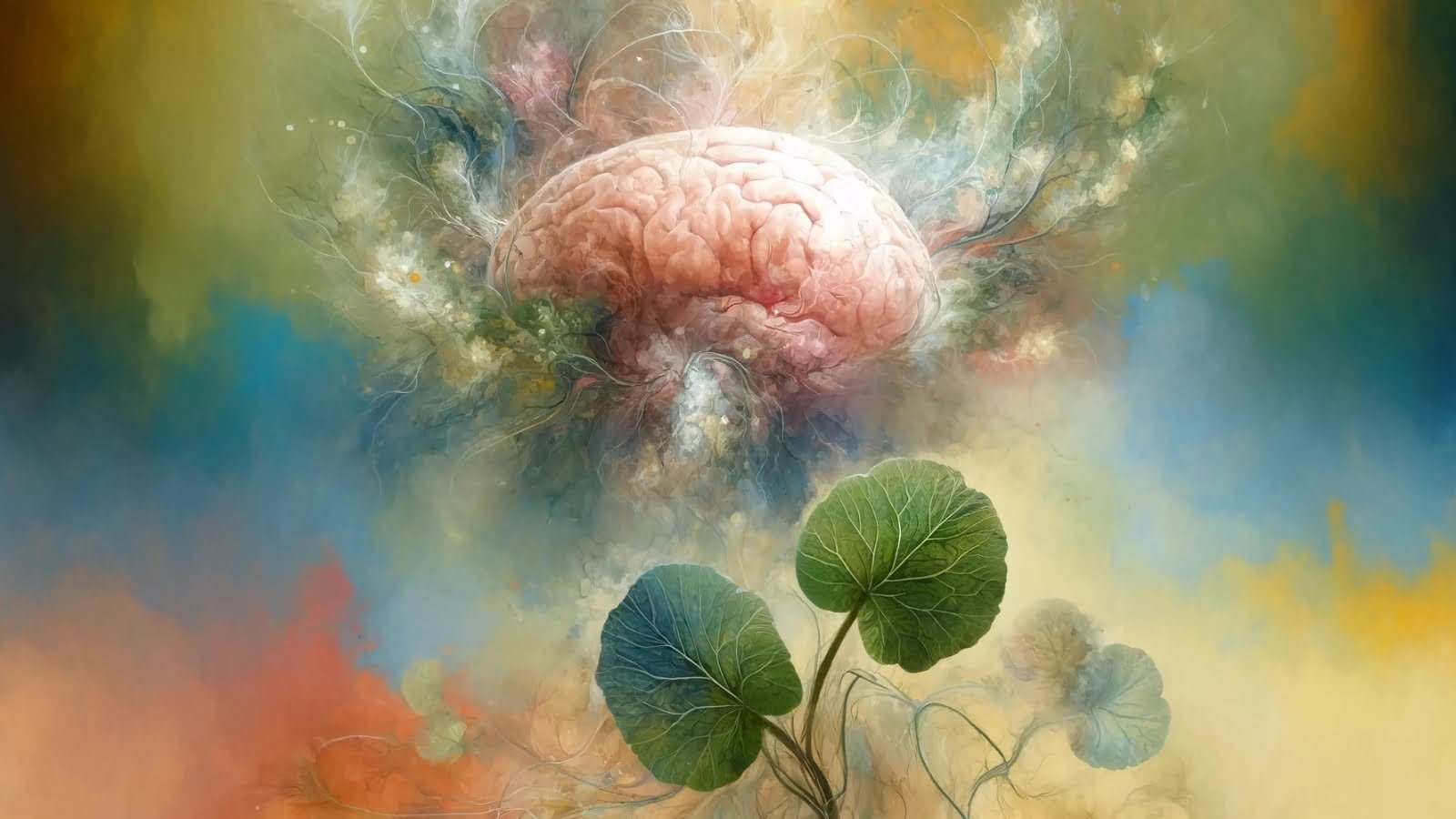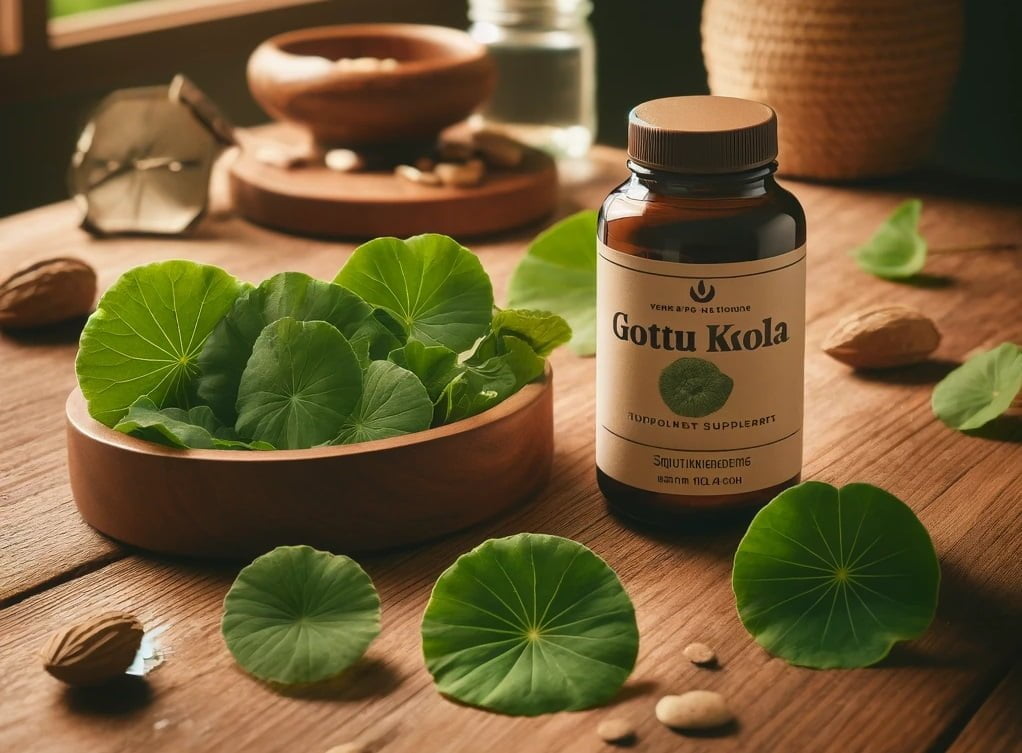
Gotu Kola is a tropical plant that can sharpen your mind, reduce anxiety, and even protect against neurodegenerative diseases.
This medicinal herb enhances memory, learning, and neuroplasticity while reducing anxiety and stress. Rich in triterpenoids and flavonoids, gotu kola modulates neurotransmitters and fights oxidative stress.
Generally safe when used as recommended, it compares favorably to other natural nootropics, providing a holistic approach to cognitive enhancement and overall brain health.
Table of Contents
What is Gotu Kola?
Gotu kola (Centella Asiatica – family: Apiaceae), also known as Indian pennywort, is a tropical medicinal herb from some Asian and African countries.
The plant has round-lobed, bright green leaves and small pink flowers with a faint fragrance. It has been used for centuries in traditional ayurvedic medicine and Chinese medicine.

In India, it is known as the ‘student herb’ because of its cognitive and memory benefits. In Chinese traditions, it has been culturally proclaimed as the ‘longevity herb’, for its benefits against age-related decline.
Beyond its brain-boosting properties, gotu kola also enhances wound healing and improves venous circulation, showcasing its diverse therapeutic applications.
From managing major depressive disorders to preserving cardiovascular health, gotu kola has been widely studied and adopted for gaining peak health.
What Are The Main Bioactive Compounds of Gotu Kola?
The primary active compounds in gotu kola are triterpenoids. They bear most of the markers of cognitive health benefits, while some minor non-cognitive benefits.
- Asiaticoside: Has anti-inflammatory and wound healing properties
- Madecassoside: Has antioxidant properties and supports skin health
- Asiatic Acid: Carry neuroprotective effects and enhance cognitive function
- Flavonoids: Contain quercetin and kaempferol, known for antioxidant and anti-inflammatory properties
- Phytosterols: Lower cholesterol levels in the blood
- Amino Acids: Energy modulators for physiological processes
What Are the Key Nootropic Benefits of Gotu Kola?
Gotu kola offers a range of nootropic benefits, enhancing cognitive functions and making it a promising natural remedy for cognitive enhancement.
Research highlights its ability to:
- Support neuroplasticity
- Protect neurons
- Reduce inflammation and oxidative stress

Can Gotu Kola Improve Memory and Learning?
Yes, gotu kola improves memory and learning capabilities. An experiment showed drastic memory enhancement when subjects were observed for the dosage of 500 mg, twice per day for 2 months.(1) This shows gotu kola triggers neuroplasticity, a precursor for learning and memory formation.
Gotu kola positively transforms neural dendrites, the branched extensions of neurons, responsible for neural communication. This results in the sharpening of memory and the reversal of brain damage.
In another study, researchers found similar results of neuroplasticity on memory enhancement in participants of older age.(2)
The herb also combats oxidative stress, a factor known to impair cognitive function. A study showed that inducing gotu kola extract to participants helped them perform better in spatial learning and memory tasks.(3)
Does Gotu Kola Reduce Anxiety and Stress?
Yes, gotu kola reduces anxiety and stress levels by exerting its anxiolytic effects through the modulation of neurotransmitters and anti-inflammatory activity. This has also been proven to suppress major depressive disorders.
Gotu kola mediates neurotransmitters like GABA and serotonin, which improves the communication quality between neurons. Research testing gotu kola for 1000 mg/day for 60 days, shows drops in anxiety and stress levels.(4)
Gotu kola also inhibits inflammatory pathways and reduces neuroinflammation, contributing to its stress-reducing effects. This way, the body’s stress response is kept under check.
Oxidative stress is another reason for the buildup of anti-inflammatory pathways. Gotu kola counters that by stimulating the antioxidant enzyme system and brain-derived neurotrophic factor (BDNF), as encountered and proven in research.(5)
How Does Gotu Kola Protect Against Neurodegenerative Diseases?
Gotu kola counters neurodegenerative diseases such as Alzheimer’s, Parkinson’s, and Chronic Traumatic Encephalopathy (CTE). Studies have shown an active role of anti-inflammatory and antioxidant qualities in protecting neurons.
A study demonstrates enhancement of cognitive function against Alzheimer’s disease symptoms through this herb’s ability to reduce amyloid plaque formation and oxidative stress in the brain.(6)
Gotu kola also improves neuroprotective standards for Parkinson’s disease by reducing neuroinflammation and preserving dopaminergic neurons.(7)
To mitigate the effects of CTE, gotu kola minimizes cognitive impairments associated with repeated head injuries.(8)
Can Gotu Kola Serve as a Natural Mood Enhancer?
Gotu kola has garnered attention for its ability to improve mood. Scientific literature shows such mood-enhancing effects through the modulation of neurotransmitters.
One study found that gotu kola extract led to reductions in anxiety-like behaviors and improvements in mood-related parameters.(9)
Other research hints at significant reductions in depressive symptoms. These effects were attributed to Gotu Kola’s ability to modulate neurotransmitter systems.(10)
How Can Gotu Kola Be Used?
Gotu kola can be incorporated into the diet, including fresh leaves, dried herbs, capsules, tablets, tinctures, and teas.
The recommended guidelines differ by individual, reason, and duration of use.

How Much Gotu Kola Should Be Taken Daily for Cognitive Benefits?
Generally, the following dosages are considered safe and effective:
| Form | Dosage | Frequency |
| Dried Herb | 600-1,800 mg | 3 doses/day |
| Standardized Extract (10% Asiaticoside) | 30-60 mg | 2-3 times/day |
| Tincture (1:2) | 30-60 drops | 3 doses/day |
The recommended daily dosage of gotu kola for cognitive benefits varies depending on the form of consumption.
It’s essential to start with a lower dose and gradually increase it to assess tolerance and avoid potential side effects.
Are There Any Guidelines Using Gotu Kola?
While gotu kola is considered safe for long-term use, it’s important to follow these guidelines:
- Consult with a Healthcare Professional: Consider health history, preexisting medical conditions, and current medications
- Start with a Lower Dosage: Gradually increase Dosage. Monitor the body’s response.
- Duration of Use: Safe for short-term consumption (up to 14 days). Practice cautious consumption for long-term use.
- Contraindication: Responses can vary for individuals. Monitor side effects. May interact with other medications.
Is Gotu Kola Safe to Supplement?
Gotu kola is considered safe when taken at recommended doses. However, it’s important to be aware of potential side effects, contraindications, and interactions with medications or other supplements.
Are There Any Common Side Effects?
Gotu kola is well-tolerated, but some people may experience side effects, such as:
- Digestive discomfort (e.g., nausea, diarrhea, abdominal cramps)
- Headache
- Dizziness
- Skin irritation (when applied topically)
Who Should Avoid Using Gotu Kola?
Certain individuals should avoid using gotu kola or consult a healthcare professional before use:
- Pregnant or breastfeeding women
- Liver disorder
- Plant allergic
- Scheduled for surgery
Can Gotu Kola Interact with Medications or Other Supplements?
Yes, gotu kola may interact with certain medications or supplements:
- Anticoagulant and antiplatelet drugs: Risk of bleeding
- Sedatives: Excessive drowsiness
- Diabetes medications: Hypoglycemia
- Other herbs with similar effects: Synergistic interactions
How Does Gotu Kola Compare to Other Nootropics?
Gotu kola offers several advantages over synthetic nootropics and compares favorably to other natural nootropics. A side-by-side comparison can be reached by isolating unique competencies different nootropic supplementation brings over the other.
What Are the Advantages of Using Gotu Kola Over Synthetic Nootropics?
Gotu kola has several advantages over synthetic nootropics:
- Natural origin: Generally considered safer and more tolerant
- Multiple active compounds: Synergistic effects
- Long history of use: Generational practical validity
- Additional health benefits: Wound healing, skin health, and cardiovascular support
How Does Gotu Kola Stack Up Against Other Natural Nootropics?
Gotu kola stands out for its anxiolytic effects and safety profile.
Other similar natural nootropics in terms of their cognitive benefits and safety profile include:
- Bacopa Monnieri: A perennial herb with anti-anxiety and mood-boosting properties
- Lion’s Mane Mushroom: A medicinal fungus with calming effects
- Ginkgo Biloba: A tree that protects memory
- Wattanathorn, Jintanaporn, et al. “Piperine, the potential functional food for mood and cognitive disorders.” Food and Chemical Toxicology 46.9 (2008): 3106-3110.↩
- Kumar, Anil, Samrita Dogra, and Atish Prakash. “Neuroprotective effects of Centella asiatica against intracerebroventricular colchicine-induced cognitive impairment and oxidative stress.” International Journal of Alzheimer’s disease 2009 (2009).↩
- Paramageetham, C. H., G. Prasad Babu, and J. V. S. Rao. “Somatic embryogenesis in Centella asiatica L. an important medicinal and neutraceutical plant of India.” Plant cell, tissue and organ culture 79 (2004): 19-24.↩
- Jana, Sonali, and Gyan S. Shekhawat. “Anethum graveolens: An Indian traditional medicinal herb and spice.” Pharmacognosy reviews 4.8 (2010): 179.↩
- Zhang, Jing, et al. “Genome of plant maca (Lepidium meyenii) illuminates genomic basis for high-altitude adaptation in the central Andes.” Molecular plant 9.7 (2016): 1066-1077.↩
- Xu, C. L., Wang, Q., Zhang, Y., & Yu, L. C. “Effects of Asiaticoside on Cognitive Deficits in a Rat Model of Alzheimer’s Disease.” Pharmacology, Biochemistry, and Behavior, vol. 85, no. 3, 2006, pp. 522-528.↩
- Shinomol, G. K., Muralidhara, & Bharath, M. M. “Exploring the Role of ‘Brahmi’ (Bocopa Monnieri and Centella Asiatica) in Brain Function and Therapy.” Neurochemistry International, vol. 59, no. 6, 2011, pp. 637-648.↩
- Sharma, A., Paliwal, S., & Dwivedi, A. K. “Neuroprotective Potential of Centella Asiatica and Its Triterpenes: A Review.” Journal of Pharmacy and Pharmacology, vol. 68, no. 2, 2016, pp. 148-160.↩
- Wattanathorn, Jintanaporn, et al. “Positive modulation of cognition and mood in the healthy elderly volunteer following the administration of Centella asiatica.” Journal of ethnopharmacology 116.2 (2008): 325-332.↩
- Bradwejn, Jacques, et al. “A double-blind, placebo-controlled study on the effects of Gotu Kola (Centella asiatica) on acoustic startle response in healthy subjects.” Journal of clinical psychopharmacology 20.6 (2000): 680-684.↩
